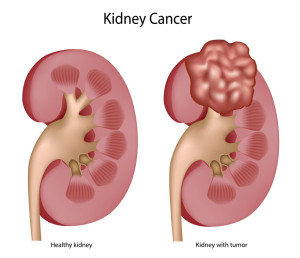Introduction
Kidney cancer is responsible for about 3% of all cancers. It usually occurs on one kidney. As we can live on only one kidney, this gives the oncologist the chance to cure the patient by taking the affected kidney out (radical nephrectomy), which is one of the more successful therapies for kidney cancer.
However, the cancer needs to be detected early and fortunately this often is the case as blood in the urine (hematuria) often occurs still at an an early stage. Blood in the urine then is an important symptom, which should alert the patient and physician alike to check out the kidney.
The old name for kidney cancer was “hypernephroma”, which is only one word. However, nowadays only the older physicians use this name. The actual medical term for kidney cancer is “renal cell carcinoma”, which is the correct pathological term, but consists of three words. Even doctors relate easier to the two word term “kidney cancer”.
References:
1. Cancer: Principles &Practice of Oncology.4th edition. Edited by Vincent T. DeVita, Jr. et al. Lippincott, Philadelphia,PA, 1993. Chapter on Cancer of the kidney and ureter.
2. Cancer: Principles&Practice of Oncology. 5th edition, volume 1. Edited by Vincent T. DeVita, Jr. et al. Lippincott-Raven Publ., Philadelphia,PA, 1997. Chapter on Cancer of the kidney and ureter.
3. D Baris et al. Am J Ind Med 2001 May;39(5):463-476.
4. A Heiser et al. Cancer Res 2001 Apr 15;61(8):3388-3393.
5. A Gati et al. Cancer Res 2001 Apr 15;61(8):3240-3244.
6. P Lissoni et al. Anticancer Res 2001 Jan-Feb;21(1B):777-779.
7. X Guo et al. Cancer Res 2001 Mar 15;61(6):2774-2781.
8. A Bergstrom et al. Int J Cancer 2001 Apr 1;92(1):155-157.







